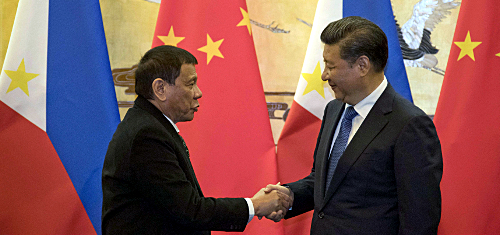 China and the Philippines have struck a deal to boost tourist travel between the two Asian nations.
China and the Philippines have struck a deal to boost tourist travel between the two Asian nations.
On Thursday, Philippine news outlet Business Mirror reported that China and the Philippines had reached agreement on implementing a 2002 memorandum of understanding signed by both countries. The goal of the MOU is to encourage investment in tourist infrastructure and to boost tourist traffic between the countries.
The first beneficiary of the new arrangement will be a twice-weekly charter flight service between the Chinese city of Guangzhou and Laoag, the capital of Ilocos Norte province in the Philippines. The flights, which get underway on Nov. 1, promise to deliver 400 Chinese tourists per week.
Interestingly, the charter service was initiated by the Jimei Group, a Macau-based casino junket operator that also operates two casinos in the Philippines, including the Fort Ilocandia and Resort Casino in Laoag.
Philippine Department of Tourism secretary Wanda Corazon T. Teo made no efforts to hide the fact that the incoming Chinese tourists “will stay at Fort Ilocandia, where they could play golf, and at the casino.”
Teo’s willingness to promote casinos as a draw for Chinese tourists is surprising given that country’s recent detention of 18 representatives of Australian casino operator Crown Resorts, allegedly due to activities involving promoting gambling to Chinese VIPs.
China issued explicit warnings last year to Crown and other casino operators to cease their marketing efforts in China. In 2015, Chinese authorities arrested 14 South Koreans for promoting travel to casinos operated by Paradise Co Ltd and Grand Korea Leisure. The arrests were part of China’s Operation Chain Break, a crackdown targeting “foreign casino activities.”
But news of the China-Philippines tourism deal came during the first official visit to China by new Philippines President Rodrigo Duterte, who witnessed Thursday’s MOU signing. The day before, Duterte (pictured left, shaking hands with China President Xi Jinping) declared that his country intended to establish more formal ties with China (and possibly also with Russia) while ditching the Philippines’ longstanding alliance with the United States.
Beijing welcomed Duterte’s comments, with Chinese media op-eds praising him for “redesigning Philippine foreign policy based on Philippine interests.” It certainly appears that one of the fringe benefits of the new alliance will be a more tolerant view of Chinese citizens travelling to the Philippines for the purpose of gambling, which could give Philippine casinos a leg up on their Asia-Pacific competitors.